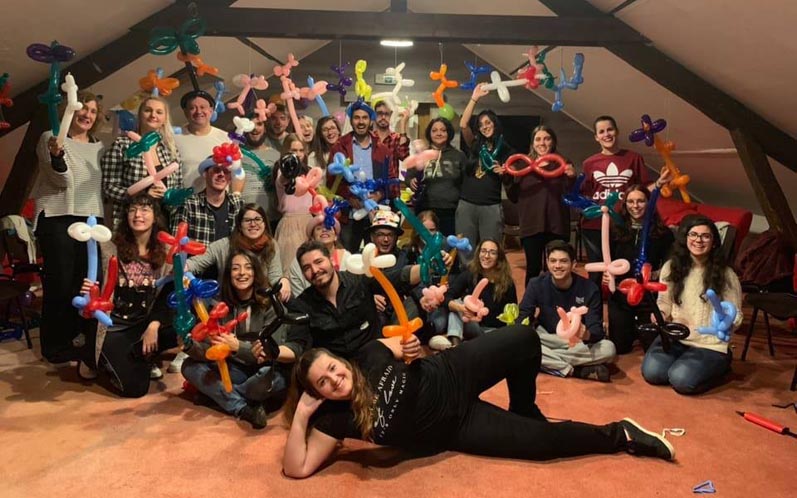
"VAN" (Europe Bureau - Aleksey Vesyoliy) :: Youth work plays an essential role in reaching and bringing together young people who face exclusion on a daily basis. Local communities have a huge potential in terms of informing, making awareness, engaging local community members.
Youth engagement is one of the key words in the youth field. Youth engagement is the result when young people are involved in responsible, challenging actions to create positive social change. This means involving youth in planning and in making decisions that affect themselves and others. Youth engagement happens in youth-adult partnerships that are structured so that both groups contribute, teach, and learn from each other.
Youth engagement is a central principle of youth development. According to the perspective of human development, young people are agents of their own development. Youth are more than passive recipients of external influences; instead they are actively involved in shaping their development by interacting with the people and opportunities made available within their environments. Through youth engagement, communities can do a better job of creating the services, opportunities, and supports that young people need to develop in various ways. Youth engagement offers community leaders the expertise and partnership of young people, helping adults fully understand what it is like to grow up in a rapidly changing world. Youth engagement is important because young people deserve the right to represent their own interests. Youth civic engagement is also critically important to prepare young people to be active citizens in a democracy.
In order to explore specific methods designed for youth more active engagement three Latvian youth leaders travelled to Belgium to take part in the international training course "Globally Connected, Locally Engaged". Training course gathered together youth leaders and youth workers from Belgium, Estonia, Spain, Portugal, Croatia, Bulgaria, Italy, Turkey, Latvia and Cyprus.
The main goal of the international training course was to raise the capacity of youth workers and young leaders to contribute a cohesive society though animation methods and techniques that could reach more and more young people.
Training course was based on practical work and during activities participants were able to explore different methods of non formal learning and to deeper understanding–of various social issues relevant for the participants (social exclusion, active participation, discrimination, various global issues etc. – based on the needs of the group and the local context;). As well to explore different methods – various techniques of animation (developing practical skills in Face painting,Integration dances,Long balloons curving,Theater,Origami,Klanza animation scarf,Big soap Bubble creation, Simple chemical experiments,Board games that does not require knowing the common language,Creative recycling, Puppet theater, Introduction to circus activities,Preparing flashmobs and etc.).
Participants were in charge of every workshop, for example, making origami and bracelets, acryl painting, recycling, Puppet Theater, balloon curving, board games with no common language, flash mobs. Developing, planning, implementing and evaluating a final activities – the group went through all the important steps of creating a practical workshop to local people, which they acquired during the training course days by implementing the final activities in Brussels.
Participants were able to explore different cultures as well. There was different intercultural night every evening, so participants introduced their peers with their traditions, dances, food, drinks. In addition each country prepared a proper traditional lunch or dinner as well.
Training course was very good organized. For the first seven days participants stayed in a small village in Belgium which helped to get to know each other very well. Staying in the small village there were no distractions, and participants were able to focus on their workshops.
For the last few days, all group moved to Brussels and participants had to test their gained skills and knowledge implementing different practical activities for specific target group there. First option was to take part in Spaghetti Day activities, second option was to visit Youth center for refugees. Third option was the most difficult and challenging one – participants of this group had to invite children from nearby schools to creative workshop and activity day in the hotel that we were staying at.
Activity that probably all of the participants will remeber the best is a short presentation we were given about feedback. From which youth leaders learned how imprtant it is to use "and" instead of "but" when giving a feedback. Few participants even got this short phrase tattooed on them, because we were using it quite a lot.
During the training participants all became friends and time went by so fast, that it was quit sad to say goodbye. This training course was incredibly useful and interesting. Ten countries shared their traditions and culture, almost thirty participants shared their experiences and knowledge. Participants learned so many new ways how to entertain and engage kids as youth workers and volunteers, gained skills to create workshops and most important had so much fun while doing it.
Youth engagement is a win-win proposition:
• Young people benefit by gaining skills, knowledge, self-esteem, and connectedness.
• Adults benefit by enhancing their own competencies, learning to better understand and value youth, and increasing their commitment and energy to their organizations.
• Organizations benefit by improving their programs, gaining community recognition, and attracting funders.
• Communities benefit by improving quality of life, coordinating youth services, and authentically embracing diversity by representing young people.
International Training course "Globally Connected, Locally Engaged" was implemented within the European Union program Erasmus+ KA1 and Latvian partner was Non - Governmental Organization "Donum Animus". Erasmus+ KA1 program provides opportunities for individuals to improve their skills, enhance their employability and gain cultural awareness. Beneficiaries are able to spend a period of time in another participating country gaining valuable experience of life, study and work with the aim of increasing the opportunities available to them in the future. Key Action 1 is the largest action in Erasmus+ with focus on increasing mobility and skills.
Please find full story with pictures at EUNetwork.lv.
संबंधित खबरें
Responses
Leave your comment